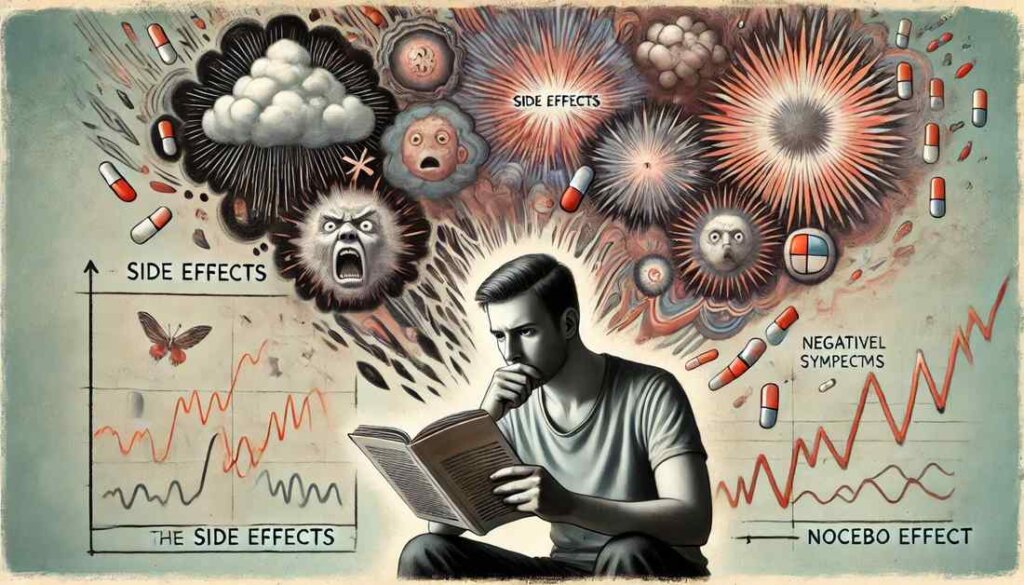Have you ever noticed how when you expect something unpleasant to happen, you become worried or even sick? That’s because your thoughts can have a significant impact on your health, sometimes more than you know.
Let’s look at how strong your thoughts are and what you can do to ensure they’re beneficial rather than harmful to your health.
Causing Physical Symptoms via the Nocebo Effect

Have you ever read about a medication’s side effects and then experienced them? This is the nocebo effect at work. If you anticipate anything terrible, your body may react by producing those symptoms.
For example, if you believe a new prescription would cause headaches, you may have headaches even if the pill is simply a sugar tablet. This occurs because our thoughts can occasionally deceive our bodies into believing that symptoms are genuine.
Scientific investigations support this claim. Dr. Fabrizio Benedetti’s research found that persons who expected to be in pain reported feeling more pain. Even when they received innocuous treatments.
Increased Anxiety Due to Evolutionary Conditioning

Our predecessors lived by anticipating danger. They were always prepared for the worst, which kept them alive. If they heard a rustling in the bushes, it could have been a predator. We don’t need to run from tigers anymore, but our brains still function like we do.
As a result, we frequently overthink ordinary health conditions, exaggerating their significance.
For example, think about having a small headache. Instead of just accepting it as something minor, you might start worrying that it’s a serious illness. This worry makes you even more anxious, which can make the headache feel worse.
Your brain’s instinct to prepare for danger is making a small issue seem much bigger than it really is.
According to a study published in Nature Neuroscience, our amygdala (the brain’s fear center) is still designed to cause anxiety when we perceive a threat. This was useful thousands of years ago, but it can now make us worry about minor health issues. (Source)
Increased sensitivity to pain and discomfort

When we expect something to hurt, we often feel it more acutely. For example, if a doctor warns you that a shot will be exceedingly painful, even if it isn’t. Harvard Medical School conducted a study in which patients were given pain medications and offered varying stories about what to expect.
Those who expected a lot of pain experienced it more than those who were reassured. (Sources)
This shows how powerful our expectations can be. If you go into a situation thinking it will be painful, your brain makes you more sensitive to that pain. Imagine getting a flu shot and expecting it to be awful. You may end up feeling more pain than someone who goes in thinking it will be quick and easy.
Your thoughts shape your experience, and the more you focus on the potential pain, the more likely it is that your body will respond to that expectation.
Increased physical stress response.

Stress is the body’s technique of preparing for danger. If you constantly worry or think negatively, your body will remain stressed. This means more stress hormones, such as cortisol, are released into your system.
Long-term high cortisol levels might cause major health concerns. It can result in excessive blood pressure, lowered immunity, and potentially heart disease.
For example: Think about an upcoming exam. If you continue to worry about failing, your body may remain under constant stress. You might feel nervous, have difficulties sleeping, or develop headaches. This is because the negative thoughts cause your body to release too much cortisol, making you feel physically ill.
Stanford University researchers discovered that negative thoughts increase the strength and duration of the stress response. People who usually think negatively have significantly greater cortisol levels than those with a more positive mindset. (Sources)
Reducing the effectiveness of treatments

Your expectations of medical treatments can influence how effectively they function. If you believe a medicine will not benefit you, it may function less successfully. This also contributes to the nocebo effect.
For example: Imagine you are taking a headache pill but are convinced it won’t work. Because you believe it won’t help, you might still feel the headache even after taking the medicine. Your negative thoughts can actually prevent the treatment from doing its job, simply because of your expectations.
According to research published in The Lancet, persons who were suspicious of their treatment were 30% less likely to feel better. Negative ideas in the mind obstructed the medication’s beneficial effects. (Sources)
Meditation and Mindfulness: The Best Solution

Meditation and mindfulness are two of the most effective strategies to keep bad thoughts at bay and improve your health. These activities help you become more aware of your thoughts and stay in the moment without judging yourself.
Meditation is like teaching your mind to think positively and be calm. Meditation helps us learn to manage our anxious thoughts and lessen stress.
For example, Mindfulness-based Stress Reduction (MBSR) has been shown to alleviate pain and anxiety. According to a study published in Psychosomatic Medicine, persons who exercised mindfulness had reduced activity in the amygdala, making them less likely to feel worried. The less anxious we are, the less negatively our thoughts affect our physical health. Link to MBSR Study.
Mindfulness also aids in reframing negative thoughts. Rather than worrying about what might go wrong, mindfulness encourages us to accept what is happening now. If you obtain a new drug, for example, mindfulness can help you focus on the benefits rather than the side effects.
Other Useful Tips for Overcoming Negative Thoughts

Although meditation is the best technique to deal with negative thoughts, here are some more tips that can help:
Cognitive-Behavioral Techniques (CBT)
CBT can help you recognize and modify problematic thought habits. If you have negative thoughts, write them down and replace them with more positive or balanced ones. It’s an easy approach to transform unwanted thoughts into useful ones.
Positive affirmations.
Repeating positive affirmations can assist to offset negative self-talk. For example, saying oneself, “I am capable of healing,” can help you develop a positive thought habit.
Selective Information Consumption.
Don’t overburden yourself with every possible adverse effect. Ask your doctor for the necessities so you don’t get caught up in worst-case scenarios.
Surround yourself with positivity.
Spend time with people who inspire you. Positive social connections significantly reduce stress and anxiety. Surround yourself with people who will make you feel better about yourself and your health.
Physical activity.
Exercise produces endorphins, which are chemicals that make you feel good. Even a 20-minute walk can help relieve stress and improve your mood. When you are in a good mood, it is easy to think positively.
Conclusion
Your thoughts are powerful. They can either help you heal or make you feel even worse. Meditation and mindfulness are two of the most powerful methods for controlling bad thoughts and improving your health.
Other basic tactics, like positive affirmations, cognitive behavioral therapy, selective information consumption, positive social contacts, and exercise, can also be effective.
You can control your health and well-being by becoming aware of your thoughts and choosing to think in ways that benefit rather than harm you.
Your mind is more powerful than you realize—make sure it’s on your side.
To read my other blogs: Click here